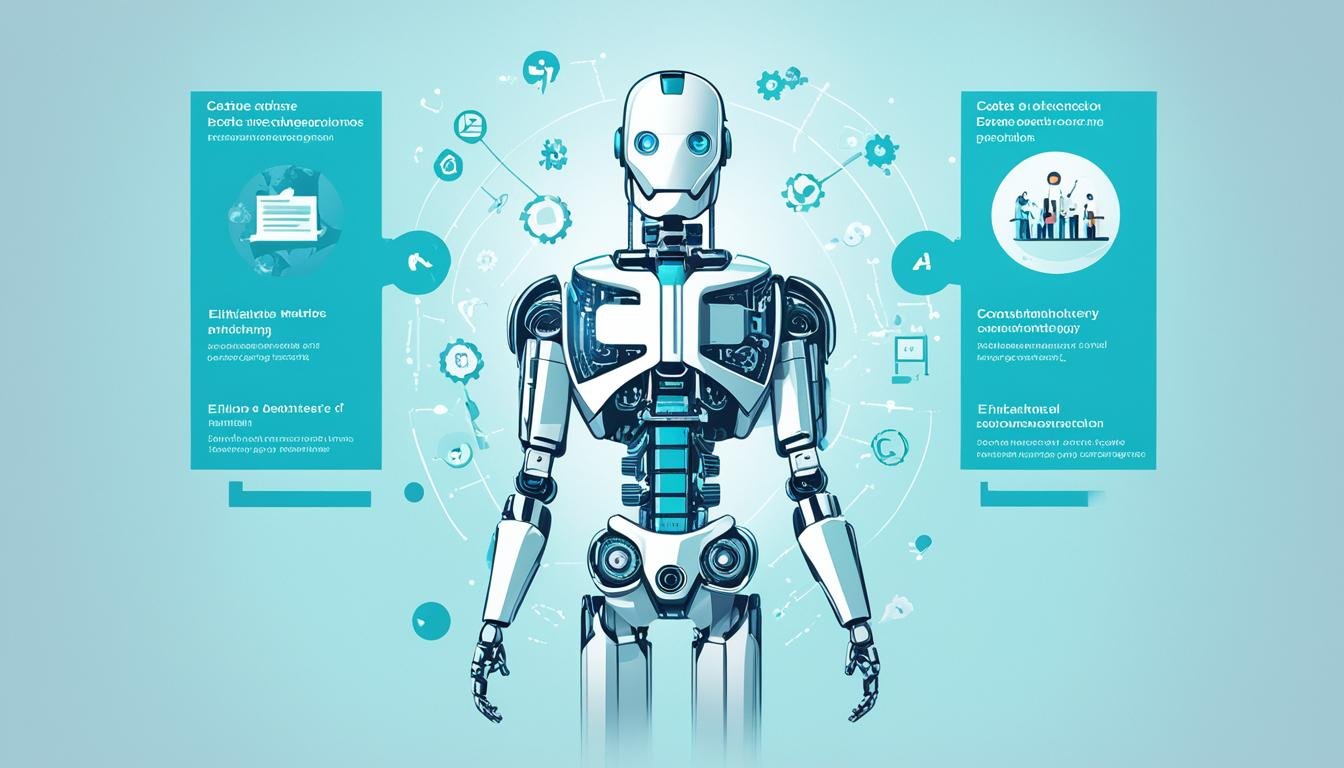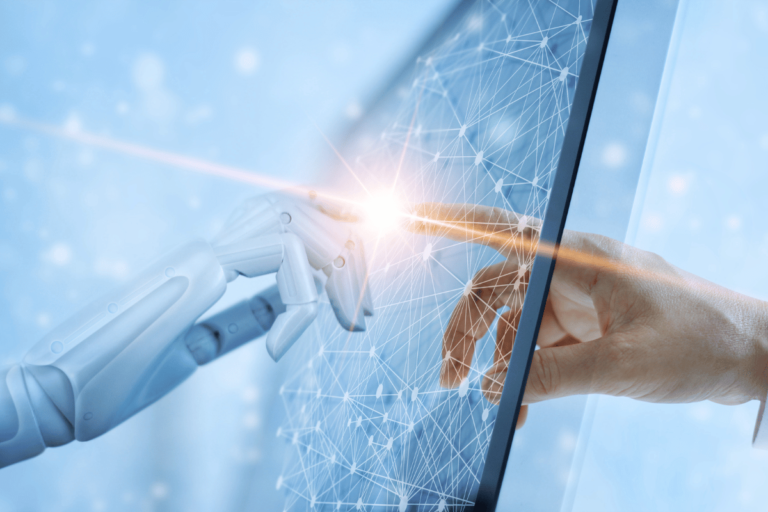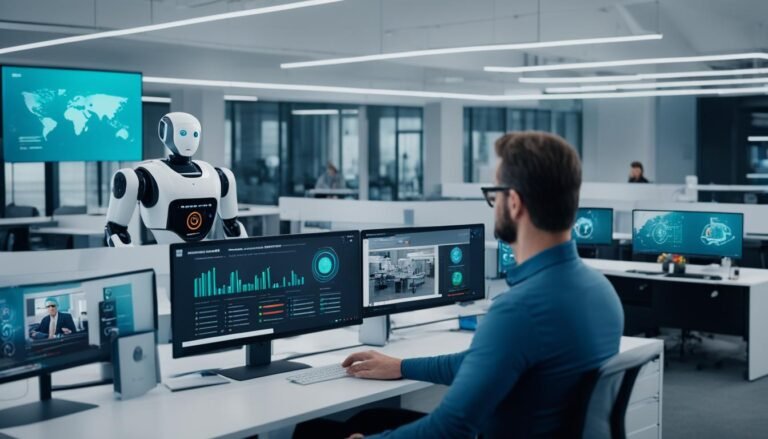Ethics in AI: Addressing the ethical challenges posed by AI technologies.
AI has changed the game in many industries, giving businesses new tools for analyzing data, automating tasks, and making decisions. But with these new powers comes big responsibilities. The fast growth of AI has brought up big ethical questions.
Did you know that businesses are spending a huge $50 billion on AI this year? By 2024, that number is expected to jump to $110 billion. This shows how big AI has become and why we need strong ethical rules for its use.
As AI moves into more areas, we must tackle its ethical issues. Things like fairness, privacy, safety, and how it affects society are very important. We need to deal with these issues quickly.
- The importance of fairness and bias mitigation in AI systems
- The need for transparency and accountability in AI algorithms
- Safeguarding privacy and data protection in the age of AI
- The impact of AI on jobs and society
- Addressing safety and security risks in AI systems
- Promoting global collaboration and governance in AI ethics
Key Takeaways:
- AI spending is set to hit $50 billion this year and $110 billion by 2024, showing how big AI is getting.
- Issues like fairness, transparency, privacy, safety, and societal impact are big ethical challenges in AI.
- It’s important to develop and use AI ethically to avoid biases, ensure accountability, protect privacy, and address societal worries.
- We need global cooperation and rules to set ethical standards for AI.
Bias and Fairness: Mitigating biases and ensuring fairness in AI systems
AI often unintentionally keeps biases from the data it’s trained on. This can lead to unfair results in hiring, lending, criminal justice, and how resources are given out.
To fix this, developers use bias detection tools. These tools spot and fix AI biases. They make sure the training data and algorithms are fair. It’s also key to use diverse data to train AI. This helps AI understand different views and make fair decisions.
Using algorithmic fairness techniques is also important. These methods use math and stats to remove biases. They make sure AI makes fair and clear decisions. By tackling biases, developers can make AI more fair and prevent unfair outcomes.
It’s crucial to make AI fair and unbiased for responsible AI. By using bias detection tools, diverse data, and fairness techniques, developers can work towards fair and equal AI systems.
Transparency and Accountability: Ensuring transparency and explainability in AI systems
AI has changed many industries, helping businesses make better decisions and automate tasks. But, there’s a big challenge with AI: it’s hard to understand how it works. This is because AI algorithms are like “black boxes,” making it tough for users to see how decisions are made.
It’s important to make AI systems clear and understandable. This builds trust and makes sure people are responsible. For example, in healthcare, doctors and patients need to know why an AI system suggested a treatment or diagnosis.
Researchers are working on Explainable AI (XAI) to fix this. XAI helps us see how AI makes decisions. This way, companies can explain why AI makes certain choices and spot biases or mistakes.
Transparent and explainable AI helps with fairness and ethics too. By knowing how AI works, companies can fix biases. This makes sure AI decisions are fair and right.
Adding transparency and accountability to AI makes AI better and more trustworthy. It lets users question AI decisions, leading to stronger AI solutions. Also, transparent AI helps companies follow the law and ethical standards, making AI safer.
In short, making AI systems transparent and accountable is key. Explainable AI (XAI) is a big part of this. By using transparent AI, companies can make better AI and help users make smart choices based on AI results.
Privacy and Data Protection: Safeguarding privacy and data security in AI
AI systems collect a lot of personal data, which raises privacy and data protection concerns. To address these, developers must use privacy-preserving techniques in AI.
Data anonymization is a key method. It removes or encrypts personal info like names or social security numbers. This way, people’s privacy rights are kept safe.
Encryption is another important technique. It keeps sensitive data secret, even if there’s a data breach or unauthorized access. Only those with the right encryption key can access the data, adding extra security.
Differential privacy is also used to protect privacy. It adds noise to data to stop people from being identified. This lets AI models learn from the data without risking anyone’s privacy.
To keep AI data secure, strong safeguards are needed. This includes controlling who can access data, keeping software updated, and doing regular security checks. These steps help prevent data breaches and surveillance.
In conclusion, keeping AI data private and secure is key to keeping trust in AI. By using privacy techniques and strong security, developers can protect people’s privacy in the AI era.
Societal Impact: Addressing the impact of AI on jobs and society
AI is getting more advanced, and it’s making people worry about its effects on jobs and society. It could change industries, automate tasks, and even replace human jobs. This raises big questions about unemployment and economic inequality.
It’s crucial to make AI ethical and think about how it affects us. We need to work on retraining programs and policies for a fair change. Also, we should set up social and economic support to lessen the bad effects of job loss.
Retraining programs are key in getting people ready for new jobs. They help workers whose jobs might be taken over by AI to learn new skills. By supporting these programs, we can lessen the harm of job loss and build a workforce that can handle new tech.
We also need policies for a fair change for workers hit by AI. This means giving them financial help, healthcare, and support to get through the tough times. By looking after workers, we can lessen AI’s impact and fight economic inequality.
Also, making AI development diverse and inclusive is vital. This way, we can spot and fix any biases in AI. It leads to fairer and more open outcomes, spreading AI’s benefits more widely across different groups.
To deal with AI’s effects on jobs and society, we need a wide-ranging plan. This plan should include good retraining programs, policies for a fair change, and a focus on diversity in AI. By doing this, we can tackle AI’s challenges and build a fair and open society.
Safety and Security: Addressing safety and security risks in AI systems
Artificial intelligence (AI) is getting more common in many industries. This means we must focus on making AI systems safe and secure. The fast growth and use of AI bring new challenges and risks. We need to tackle these to protect people and companies.
Keeping AI safe and secure means using strong cybersecurity steps. AI can face threats like data breaches and unauthorized access. So, it’s key to protect AI with strict security rules, encryption, and controls on who can access it.
For AI, cybersecurity and risk assessment go together. Knowing the risks and weak spots in AI helps companies prepare and fight threats. Doing thorough risk assessments lets us see how AI risks could affect us. Then, we can take steps to protect against them.
Developers also have a big role in keeping AI safe. They should follow the best ways to make software. This helps reduce risks and keeps AI systems secure. It’s also vital to keep an eye on things and update regularly to meet new threats.
Working on safety and security in AI helps prevent harm and makes AI more trustworthy. This trust lets more people and companies use AI. It’s important for companies to focus on cybersecurity, risk assessment, and good software development. This way, we can make a safe AI world.
Global Collaboration and Governance: Promoting collaboration and governance in AI ethics
AI governance, international collaboration in AI, and responsible AI frameworks are key to tackling AI’s ethical challenges. As AI spreads worldwide, we need to work together. Governments, industries, and civil society must join forces to create standards for responsible AI use.
Working together globally lets us share ideas and best practices. It helps us find ethical principles for AI. With different views and skills, we can make ethical AI frameworks that respect various cultures and values.
Responsible AI frameworks are vital for those making AI. They set out the rules for building and using AI in a way that respects human rights and ethical values. They focus on things like being clear, fair, accountable, and private, guiding AI use in all areas.
Establishing Clear Lines of Accountability
AI governance means setting clear accountability for AI systems. It’s about defining what different people and groups should do. This makes it clear who is responsible and helps follow ethical rules and laws.
Also, audits and oversight are key for responsible AI. Audits spot biases or unfairness in AI algorithms. Oversight keeps things transparent and accountable.
Benefits of International Collaboration
Working together on AI has many upsides. It combines resources, knowledge, and skills from around the world. This leads to stronger, more effective AI ethics frameworks.
It also helps us understand how AI affects society. Countries can share insights on risks like job loss, privacy, and the digital gap. Together, we can find ways to make AI’s benefits fair for everyone.
Lastly, working together helps make rules consistent worldwide. It aligns policies and guidelines, reducing confusion and promoting global responsible AI practices.
Conclusion: A call for ethical AI development and deployment
Addressing the ethical challenges of AI is key to using it well and avoiding harm. We must make sure AI is developed and used in a way that’s ethical and responsible. By using AI ethics principles like fairness, transparency, and privacy, we can make sure AI is fair, clear, and respects our privacy.
Working together is important for ethical AI. Researchers, developers, policymakers, and groups can share knowledge and solve ethical problems together. We need to fight biases in AI and make sure it’s fair. We also need to look at how AI affects jobs, education, and people’s well-being.
Creating rules that follow AI ethics is vital. These rules can guide how AI is used responsibly. With the right rules, we can make sure AI is open, accountable, and protects our rights. We need a place that encourages new ideas but also keeps us safe from risks.
In conclusion, making AI ethical is key to making sure it helps people without causing harm. By sticking to ethics like fairness and privacy, we can create AI that’s trustworthy and good for everyone.







